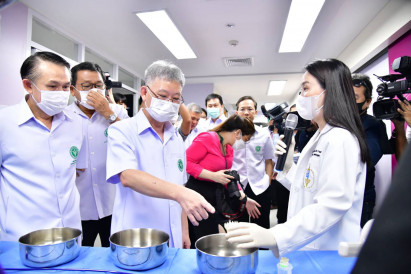
A centre for percutaneous pulmonary valve implantation (PPVI) has been established through an alliance of seven medical institutes, to make the treatment more efficient and lower the mortality rate among children with congenital heart disease, the Public Health Ministry said.
The institutes recently signed a memorandum of understanding (MoU) at a ceremony chaired by public health permanent secretary by Opas Karnkawinpong.
The signees included the Centre of Excellence in Paediatric Cardiology at Queen Sirikit National Institute of Child Health; the Naradhiwas Rajanagarindra Heart Centre at Songklanagarind Hospital; the Cardiovascular Excellence Centre at Rajavithi Hospital; Central Chest Institute; Maharat Nakhon Ratchasima Hospital; Surat Thani Hospital; and Hat Yai Hospital.
Queen Sirikit National Institute of Child Health has been working with the Naradhiwas Rajanagarindra Heart Centre and Rajavithi Hospital to upskill medical personnel to treat heart disease since 2011, with the support of experts from Evelina London Children’s Hospital in the UK, he announcement said.
The MoU expands on their earlier cooperation to establish an international training hub for PPVI to boost surgeons’ skills and lower the mortality rate of children and teenagers with heart disease, as well as ramp up research and personnel training.
Dr Opas said half of all children with congenital heart disease undergo surgery, while 10% require repeat surgery due to the complexity of the disease. Each year, more than 4,000 people with congenital heart disease undergo surgery. Of those, 400 need repeat surgery, mostly related to a pulmonary valve replacement.
PPVI can shorten the time patients wait to get their surgery and lower the chance they must go through the ordeal again, Dr Opas said. The cost is 600,000 to 1 million baht per treatment. Since 2013, Queen Sirikit National Institute of Child Health has treated around 50 patients with PPVI, allowing them to resume their normal lives, Dr Opas said.
According to medical websites, PPVI is also known as transcatheter pulmonary valve replacement and involves minimally invasive surgery to replace a failing pulmonary valve in the heart.

